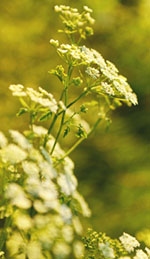 Carrots have been around the Middle East and throughout Europe for centuries. The Greeks and the Romans were well aware of the medicinal properties of carrot seed essential oil. Vitamin A and carotene were identified by early alchemists who used a mixture of carrot seed oil, bergamot, and lemon oil to treat a variety of skin and stomach disorders. The oil is harvested from the seeds of the wild carrot, Daucus carota, using steam distillation. The plant is also the source for carrot oil.
Carrots have been around the Middle East and throughout Europe for centuries. The Greeks and the Romans were well aware of the medicinal properties of carrot seed essential oil. Vitamin A and carotene were identified by early alchemists who used a mixture of carrot seed oil, bergamot, and lemon oil to treat a variety of skin and stomach disorders. The oil is harvested from the seeds of the wild carrot, Daucus carota, using steam distillation. The plant is also the source for carrot oil.
Also known as Bishop’s Lace, Bird’s Nest, and Queen Anne’s Lace, the wild carrot is a flowering plant in the Apiaceae family. It is native to temperate Europe and West Asia, and has been naturalized in North America [1]. The familiar edible root, which is unmistakably orange, is actually a cultivar, Daucus carota var. sativus, developed by the Dutch during the 17th century [1]. The wild flower that Westerners call Queen Anne’s lace, which decorates bouquets and fills fields with specks of tiny white flowers, was brought to America by English settlers. The leaves are finely detailed and the flowers appear in tiny clusters with a purple floret in the center.
Although both carrot seed oil and carrot oil are available on the market, it is important not to confuse the two. Carrot oil is an infusion of carrot root material in a carrier oil, while carrot seed essential oil is extracted from wild carrot seeds by steam distillation [2]. While carrot oil also has benefits for skin care, in general aromatherapists prefer carrot seed oil because it contains a higher concentration of active compounds. Carrot seed oil contains a-pinene, b-pinene, gamma-terpene, limonene, camphene, sabinene, myrcene, beta bisabolene, carotol and geranyl acetate, and is also rich in carotene and vitamins A and E, antioxidants with benefits for the skin and eyes [3].
Carrot seed oil may be the most underrated essential oil in aromatherapy, but there’s nothing but wellness surrounding this powerful detoxifier and skin rejuvenator. Its soft earthy smell initiates the stress-relieving characteristics in the oil, and when the oil is applied to the skin, epidermal cells are stimulated, which keeps wrinkles in check. Carrot seed oil is known for its ability to alleviate skin problems like acne, eczema, psoriasis, ulcers, weeping sores, and boils. On top of that, the oil has a natural SPF of 38 to 40, so it can be used as a topical sunscreen [2]!
The therapeutic properties of this essential oil are antiseptic, diuretic, carminative, depurative, hepatic, stimulant, vermifuge, and tonic [3]. The oil has a detoxifying effect on the liver, so it fights jaundice while cleaning the digestive system as well as all other essential systems in the body [2].
Carrot seed oil strengthens the mucous membranes, and can help alleviate arthritis, gout, rheumatism, and edema symptoms [3]. This essential oil is well known for revitalizing the skin. Rashes, eczema, and dermatitis are treated with carrot seed oil and the results have been well documented [3].
The oil is an essential ingredient in vapor therapy, which boosts the respiratory system. When the oil is massaged into the skin or diluted in a bath it relieves muscle pain and increases the production of red blood cells [3]. When carrot seed oil is blended with bergamot, juniper, lavender, lemon, lime, cedarwood, geranium, and other citrus and spicy oils, the results range from complete body detoxification to relieving fluid retention, which helps anorexia sufferers.
Essential carrot seed oil is non-toxic, but should be avoided during pregnancy and by people with asthma or epilepsy, since it tends to be very stimulating [2]. It’s a natural skin toner and tanning agent, so it’s the perfect anti-aging oil as well as an anti-wrinkle agent. Even though it is not promoted as a “Fountain of Youth,” the Romans and Greeks thought it was, and that thought is still in the minds of people around the world.
REFERENCES
1.“Daucus carota”. Wikipedia. Last modified July 28th, 2014. http://en.wikipedia.org/wiki/Daucus_carota.
2. “Carrot Seed Oil”. Carrot Museum. Accessed July 31st, 2014. http://www.carrotmuseum.co.uk/carrotoil.html.
3. “Health Benefits of Carrot Seed Oil”. Organic Facts. Accessed July 31st, 2014. http://www.organicfacts.net/health-benefits/essential-oils/carrot-seed-essential-oil.html.
